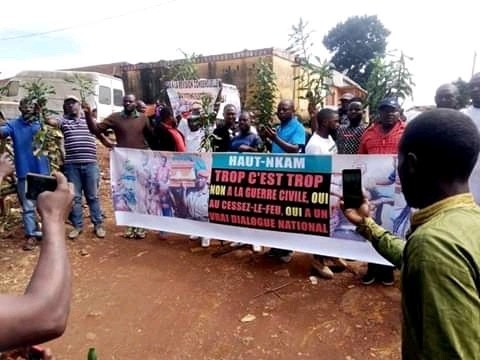CAMEROON. Cameroonians took to the streets on 22 September protesting against bad governance and dictatorship in the country.
With the announcement of regional elections planned for 6 December across the country, the leader of the Cameroon Renaissance Movement (MRC) political party, Professor Maurice Kamto, announced that his party won’t take part in the elections and will protest on 22 September.
In February 2020, the party boycotted the municipal and legislative elections, forcing the government to put an end to the Anglophone crisis in the two English speaking regions of the country.
History of 22 September
22 September is a very remarkable day for Cameroonians, especially the two English speaking regions of the country. On 22 September 2017, inhabitants of the North West and South West regions of Cameroon (the two English speaking regions) marched with peace plants demanding for freedom and separation from the other eight French-speaking regions.
Since the escalation of Cameroon’s Anglophone crisis in 2016, there has been unrest in the two regions which has led to the death of many people due to government forces and separatist fighters. This has been a major cause of the protests in Cameroon which seek to overthrow President Paul Biya and the Cameroon People’s Democratic Movement (CPDM) political party which has ruled the country for over 38 years.
Protests across Cameroon
Earlier in the day, youth were led by the Secretary General of the Popular Action Party (PAP), Fabrice Lena, in the streets of the nation’s capital, Yaounde. They marched and chanted slogans such as “We must change Cameroon, you will get tired of killing us.”
In Douala, Cameroons economic capital and the most populated area of the country, protesters clashed with security officials as tear gas and water cannons were fired at the protesters.
Most of the protesters were students, motorbike riders, and taxi drivers who say they are suffering due to government actions.
In Baham, a town in the West region of Cameroon, protesters chanted as they matched, carrying banners and posters bearing sayings like “Enough is enough, no to civil war, yes to ceasefire, yes to a true national dialogue.”
Military crack down and arrests
Since 18 September, major cities and towns in Cameroon were militarised. Armed police and gendarme officers were spotted with armored cars and trucks ready to arrest protesters.
Professor Maurice Kamto, who announced the protest, was put under house arrest and security forces were stationed at his residence in Yaounde in order not to keep him from protesting.
More than a dozen protesters were roughly handled in Douala by security officials. Some were shot and have bullet wounds while others were beaten nearly to death and ended up in the hospital.
In Yaounde, journalist Lindovi Ndjio, was arrested for questioning by security forces as he stepped out to gather information about the protest. A similar incident occurred in Douala where two journalists, Tai Javis and Tebong Christian, were arrested while on coverage.
Reactions from officials
The government banned public gatherings, stating that it was not advisable to gather in large groups during COVID-19.
On 21 September, Rene Emmanuel Sadi, Cameroons Minister of Communication, cautioned the population to stay away from the protests in a press release where he said that the protests aimed to tarnish the image of the country.
Included in the press release was this statement, “I want to say here that, for the Government of the Republic, the announced unauthorized march of September 22, 2020 is actually just another attempt to defy public authorities, to undermine public order, and the desperate expression of a will to exist or to survive, of a sinking political party, victim of both its contradictions and its misguidance.”
Individual’s reactions
Some motorbike riders in the cities of Yaounde, Douala, Maroua, and Bafoussam who support the government, marched on the streets before 22 September denouncing the CRM’s call to protest.
Read also: Two Key Protesters Arrested, Released On Bail While 31 More Are Targeted
Others such as a biker interviewed by Transcontinental Times, do not want to involve themselves in any protests, “I am not a politician and I don’t see why I should involve myself into political issues by marching on the streets.”
While some protest, some protest the call to protest, and others do not wish to be involved, Jean François, a journalist with Le Messager newspaper, said “We must resist the corruption of the power elite, the brutality of the corrupt elite, we must resist.”



